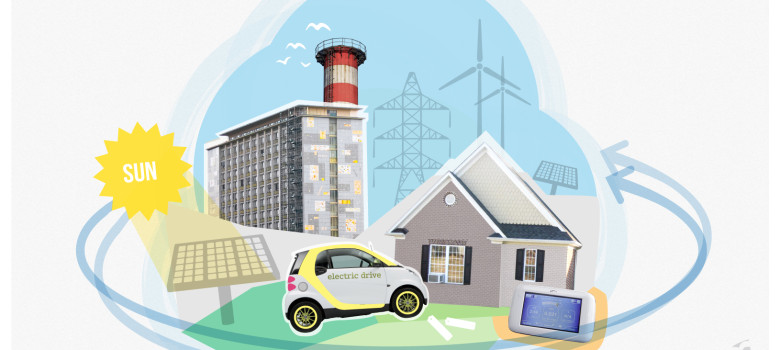
Is it time for us to all become ecomodernists?
The mainstream argument is that climate change is being accelerated by human activities. You are probably familiar with the simple narrative that man is burning fossil fuels at an increasing rate; thereby causing big increases in carbon emissions, leading to warming of the planet.
Green policies received a lot of prominence in the noughties, but have since fallen out of favour with the majority of the public (especially in the UK). In fact many ideas have been branded as too ‘niche’ and have failed ever to hit the ground running.
There are three main reasons for this:
- The global recession changed the financial goal posts for most households and businesses, making it difficult to find the initial outlay needed for them to install renewable technologies.
- The message from advocates of the green agenda lacked simplicity and clarity.
- The claims made by some of the low carbon technology manufacturers didn’t actually materialise.
Since then there has been very little political will to reignite some of the green ideas that actually made a lot of sense before they were scrapped in favour of financial consolidation and existing technologies. However, recently since the COP21 Climate Change talks, there have been small steps made towards redefining the environmentalist message for the 21st century.
The rest of this blog talks about the idea of ‘ecomodernism’ – the supposed new redefinition of the environmentalist message for the 21st century. We also discuss what it could mean for the UK.
What is ecomodernism?
You may have heard the term ‘ecomodernist’ used in the media over the past year or so, especially if you have followed recent news surrounding climate change. But what does this term actually mean?
According to the ecomodernist manifesto, humans need to use all their ‘growing social, economic, and technological powers to make life better for people, stabilise the climate, and protect the natural world’.
This doesn’t mean we have to be camping outdoors for the rest of our lives living off the ‘green green grass’ to help preserve the planet; rather we should utilise what we know today to develop technologies that mean we can live sustainably whilst at the same time trying to limit damage to the planet.
The ecomodernist term is underpinned by a manifesto co-written by 18 prominent scientists in the field from institutions such as Harvard, Breakthrough Institute and Long Now Foundation. This backing has added a philosophical element to an already confusing environmental movement.
Why are ecomodernists different to traditional environmentalists?
To put it simply: the environmentalist movement advocates a prescribed set of ideals that is at odds with how society is developing today. Traditional environmentalists have for many years stated that human societies need to be reintegrated into the natural ecosystem using natural products, utilising organic farming techniques for food cultivation and harnessing energy through renewable energy. Environmentalists don’t believe that the current capitalist system is compatible with the preservation of the planet; in fact the belief is that economic growth is perfectly correlated with an increase in pollution and its negative effects.
Ecomodernists or eco-pragmatists, on the other hand, believe that humans do not need to be at one with nature to preserve the planet and live sustainably, but rather just use resources more efficiently and effectively to allow humans and nature to prosper in harmony. For example, ecomodernists want to limit the amount of land that is used for farming, but at the same time use technology to increase crop yields so that more food can be cultivated to feed the growing global population. Ecomodernists don’t just advocate renewable energy, but believe in nuclear being central to the energy requirements needed over the next few centuries.
Before we endorse some of these ideas we have to have a look at the solutions that they advocate.
What solutions do ecomodernist theorists actually believe in?
According to the authors of the ecomodernist manifesto, the aim is to make energy efficiency and the green agenda much more appealing to the broader constituency of people. I guess the idea is that the wider public’s perception is that traditional environmentalists’ narratives have been too ‘moralising’, yet at the same time they accept that something needs to be done about wider global warming issues.
Here are some of the solutions that ecomodernists actually believe will take things forward for the green agenda:
-
- Taking coal out of the grid;
-
- Focusing on better energy efficiency;
-
- Focusing on next generation nuclear energy – specifically from thorium fuel;
-
- Giving renewable energy sources a much bigger prominence in energy generation – however some technologies given more prominence than others;
-
- Protecting wildlife from further human activities;
-
- Desalination for fresh water consumption;
- GM crops for mass production and increased land yields
A pure environmentalist would look quite damningly on these proposals, especially the approach to GM crops and nuclear power.
What would ecomodernism mean for the UK?
The UK has some of the most aged nuclear power stations in the Western world and to replace them would entail a big investment. For example, the UK needs more than £100billion of investment over the next decade to go into infrastructure (upgrade the grid) and new generation plants to replace what is being decommissioned and closed off.
The grid network system is archaic and needs to move into the 21st century. Nuclear power plants are being decommissioned and coal power plants will be closed off completely in the next 10 or so years to ensure the government meets its decarbonisation policy.
The advocates of the ecomodernist agenda have a ‘one-time’ opportunity to push various solutions in the UK to resolve grid efficiency and electricity generation whilst meeting climate change targets.
The public will need to be convinced that the cost will not adversely affect the existing economy (wages and jobs).
 Does ecomodernism have to be tied to a manifesto?
Does ecomodernism have to be tied to a manifesto?
The simple answer is that if ecomodernism were to become a popular term for the preservation of our planet and sustainable development (where we don’t have to trade off growth vs. environment), it should not be limited to a prescriptive list of solutions in a ‘theoretical essay’, written by a group of scientists. It really needs to draw upon the public imagination to reach a consensus on what would be acceptable and workable solutions that not only decarbonise the economy but also continue growth and prosperity.
What solutions would be acceptable to the public?
Most people would not disagree with the list of solutions explored in the ecomodernist manifesto. Specifically, most people would agree that pushing energy efficiency and technological improvements in energy generation and protecting wildlife makes sense. Therefore, in theory we can all be ecomodernists.
The issue arises when it comes to nuclear power and GM crops, which both polarise public opinions.
The other major problem with nuclear power as a solution is the cost to build and run power stations. For example, in the UK, EDF’s Hinkley Point C is the current flagship nuclear project. The guaranteed price that EDF has agreed with the government to sell the electricity generated to the counterparties for is £92.50/MW. Yet, given that other renewables like wind power and solar are slowly getting more efficient, one could argue whether there is actually a need for such an investment when, at the end of the day (at this strike price) the electricity will be quite expensive.
Surely the UK should now be looking at exploiting more offshore wind as well as solar power because the price of those technologies is dropping. With its positioning as an island (and thus surrounded by water), the UK should really be looking at developing tidal lagoons. It could become a global leader in wave and tidal power given the investment that will go into developing the energy sector over the next few years.
Since the demise of the Green Deal (a domestic energy efficiency scheme), there hasn’t been a clear strategy on how UK home owners and businesses can use existing energy resources more efficiently. Implementing energy efficiency schemes (mainly by pushing insulation) up and down the country would not only decarbonise the economy but would also help stimulate economic growth and support 10,000s of new jobs.
Better energy efficiency needs to be backed up by better grid management systems and energy storage facilities. A smarter and more responsive grid is better than a centralised and wasteful one that currently serves the UK.
A final word…
Most of the ecomodernist ideas seem ok, but it needs to bring on board additional solutions to appeal more to the public at large. Therefore it’s no good pushing for new nuclear power in the UK if consumers would have to pay a high price for it. However, more demand responsive and localised electricity grids would be good for everyone and these elements need to be included in the arguments.
Think we missed something? Do you have a different opinion?
Comment below to get your voice heard…













I agree cheap, zero-carbon, dense, safe, abundant energy is crucial to a healthy economy. Fortunately a British company is proposing a nuclear waste eating Gen4 nuclear reactor, *conservatively* estimated to be cheaper than coal, called the Stable Salt Reactor: https://www.youtube.com/watch?v=R4GSDRqah-0
The UK government has known of it for many months but is dithering. It now looks likely that this huge business opportunity will move to Canada, who are very keen to build a pilot plant.
Its not just ‘mainstream’ environmentalists who are critical of Eco-modernism. Recommend you check these 2 pretty thorough and damning critiques of it. Chris Smaje in particular has articulated a susained and very coherent critique of Ecomodernism or ‘eco-panglossianism’ as he calls it.
Simon, you referred to two critiques but mentioned only Chris Smaje, who I just listened to. What is your other reference? Eco-modernism’s promotion of GMO’s and thorium nuclear development is presumably only becoming a stronger option every day that there is delay in turning the trend around from increasing fossil fuel consumption to decreasing consumption globally. I”m not a believer that either thorium fueled nuclear or GMO’s will be adopted due to social resistance to those options and I am fairly convinced that none of the softer approaches, such as afforestation, can happen in as short a time frame as was suggested will be needed in the SR15 report of the IPCC in Oct 2018.to have a 66% chance of holding temperature increase to less than 1.5C. BECCS, Direct Air Capture and Storage, and soil carbon sequestration together may also not be insufficient since the technologies are still not close to being scaled up or don’t yet even exist at a viable stage of conception. That is why the approaches you are suggesting are so interesting. The only real solution seems to lie in social engineering since education alone hasn’t produced any effective change in our consumption yet, as time runs out to meet the Paris target for 2050.